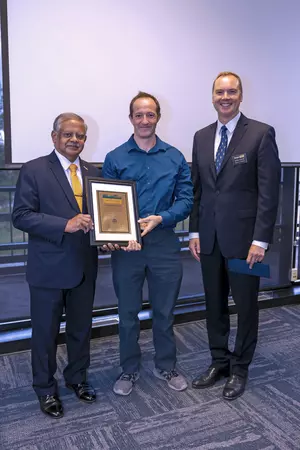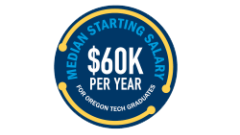
Foundation Excellence in Teaching Award
at 2022 Convocation
In the decade that Dr. David Hammond has worked at Oregon Tech, he has learned to connect the mathematics courses he teaches with the programs his students are studying so they understand how math applies to their future careers.
Hammond says his primary teaching style hasn’t changed much in 10 years — he still focuses on the fundamentals and on clearly explaining each topic. But he has adapted his examples to be more applicable to the students taking his math classes.
“One thing that has changed is that now I have more familiarity of the rest of the engineering curriculum at Oregon Tech, which students in my math classes typically have taken,” Hammond says. “This can help with choosing good examples in my classes. If I can connect what we are learning in a math class to what they have studied in their other classes, it really helps the students stay motivated.”
Hammond is originally from Southern California but he spent most of his childhood in Tacoma, Wash. He returned to California to pursue an undergraduate degree from California Institute of Technology. He then joined the Peace Corps to work as a high school math teacher in Malawi, which is between Tanzania and Mozambique in East Africa. After spending two years in Malawi, Hammond returned to the United States and obtained a Ph.D. from New York University.
Hammond says he was good at math in school but didn’t originally think of a career in it.
“In college, I intended to study chemistry or physics,” Hammond says. “I took a linear algebra class my freshman year and really enjoyed learning how to prove things mathematically. I think that experience prompted me to consider taking more math. I ended up adding a math major and completing a double major in math and chemistry.”
Hammond now enjoys seeing examples where a single mathematical concept can be used in different applications.
“It is very powerful to see physical phenomena that on the surface might seem unrelated, like a resonant electrical circuit and a kid swinging on a swing, can be described by exactly the same mathematical theory,” Hammond says.
This is one more reason Hammond has learned to adapt his teaching to resonate with students who aren’t studying mathematics, but who will still use it in their careers.
“I also think it’s important to keep being curious about the world and the subject material you decide to study,” Hammond says. “It’s very hard to stay motivated to work on something that you aren’t curious about.”
Hammond stays motivated by enjoying time with coworkers and thinking of areas he may want to expand his career in the future.
One of his favorite memories was an impromptu music session in the main lobby of the Portland-Metro campus.
“Professors Grant Kirby, Aaron Scher, and I all brought musical instruments to campus, and set up and jammed in the lobby of the campus, playing classic rock tunes,” he said.
In the future, Hammond hopes to do more with machine learning and contribute to teaching Data Science courses, both of which are available at Oregon Tech.









